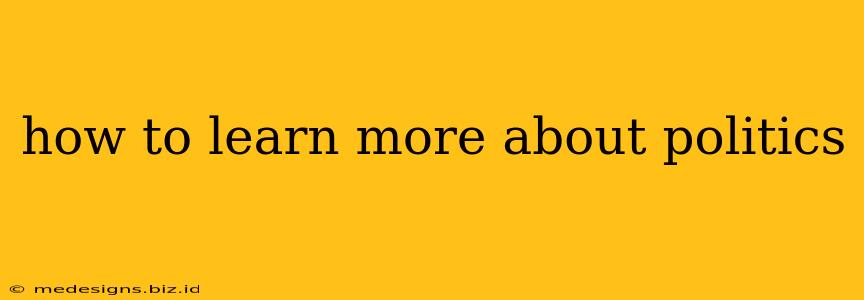Are you curious about the world of politics but don't know where to start? Feeling overwhelmed by the news cycle and unsure how to navigate the complexities of government and policy? You're not alone! Many people want to engage more deeply with politics but find it challenging. This guide provides a structured approach to learning more about politics, catering to different learning styles and levels of prior knowledge.
1. Identify Your Interests Within Politics
Politics is a broad field. To make learning more manageable and engaging, start by identifying specific areas that pique your interest. Do you care most about:
- Domestic Policy: Issues like healthcare, education, the economy, and social justice?
- Foreign Policy: International relations, diplomacy, and global conflicts?
- Specific Political Systems: Are you fascinated by the American political system, parliamentary democracies, or authoritarian regimes?
- Political Ideologies: Do you want to understand liberalism, conservatism, socialism, or other ideologies in greater depth?
- Specific Political Figures or Events: Are you intrigued by a particular historical figure or a current political event?
Focusing your initial efforts on a specific area will prevent information overload and allow for a more focused and rewarding learning experience.
2. Choose Your Learning Method
Different people learn in different ways. Experiment with these methods to find what works best for you:
A. Reading:
- News Sources: Subscribe to reputable news outlets (e.g., the New York Times, BBC News, Reuters) and read diverse perspectives. Be critical of sources and look for fact-checking organizations to verify information.
- Books: Explore books on political theory, history, specific political events, or biographies of influential figures. Look for recommendations from trusted sources or libraries.
- Academic Journals: For a more in-depth understanding, explore academic journals focusing on political science. These can be challenging but provide rich insights.
- Blogs and Podcasts: Many experts and commentators offer insightful analysis through blogs and podcasts. However, be mindful of potential bias and always cross-reference information.
B. Watching & Listening:
- Documentaries: High-quality documentaries offer engaging and informative explorations of political issues. Platforms like Netflix, Hulu, and YouTube offer a vast selection.
- Lectures and Interviews: Many universities and organizations offer free lectures and interviews on political topics online. Check platforms like TED Talks, Coursera, and edX.
- News Programs: Watch reputable news programs, but be aware of potential bias in their presentation.
C. Active Participation:
- Attend Public Forums and Meetings: Attend local government meetings, town halls, and political rallies to observe political discourse firsthand.
- Engage in Civil Discussions: Engage in respectful discussions with people who hold differing political views. This is crucial for developing critical thinking and understanding different perspectives.
- Volunteer for a Political Campaign: Gain firsthand experience by volunteering for a campaign. This offers valuable insights into the practical side of politics.
3. Build a Foundation of Knowledge
Before diving into specific issues, build a foundational understanding of core political concepts:
- Political Systems: Familiarize yourself with different forms of government (e.g., democracy, monarchy, dictatorship).
- Political Ideologies: Learn about major political ideologies and their key tenets (e.g., liberalism, conservatism, socialism).
- Political Processes: Understand how laws are made, elections are conducted, and policies are implemented.
4. Stay Updated and Critical
The political landscape is constantly evolving. To remain informed, make a consistent effort to:
- Follow Reputable News Sources: Maintain a regular habit of reading news from trusted sources.
- Develop Critical Thinking Skills: Learn to evaluate information critically, identify bias, and verify facts.
- Engage in Informed Discussions: Participate in respectful discussions with others to broaden your understanding and challenge your own biases.
Learning about politics is a continuous journey. By following these steps, you can develop a deeper understanding of the political world and become a more engaged and informed citizen. Remember to embrace diverse perspectives, engage critically, and always strive for a more informed understanding.
